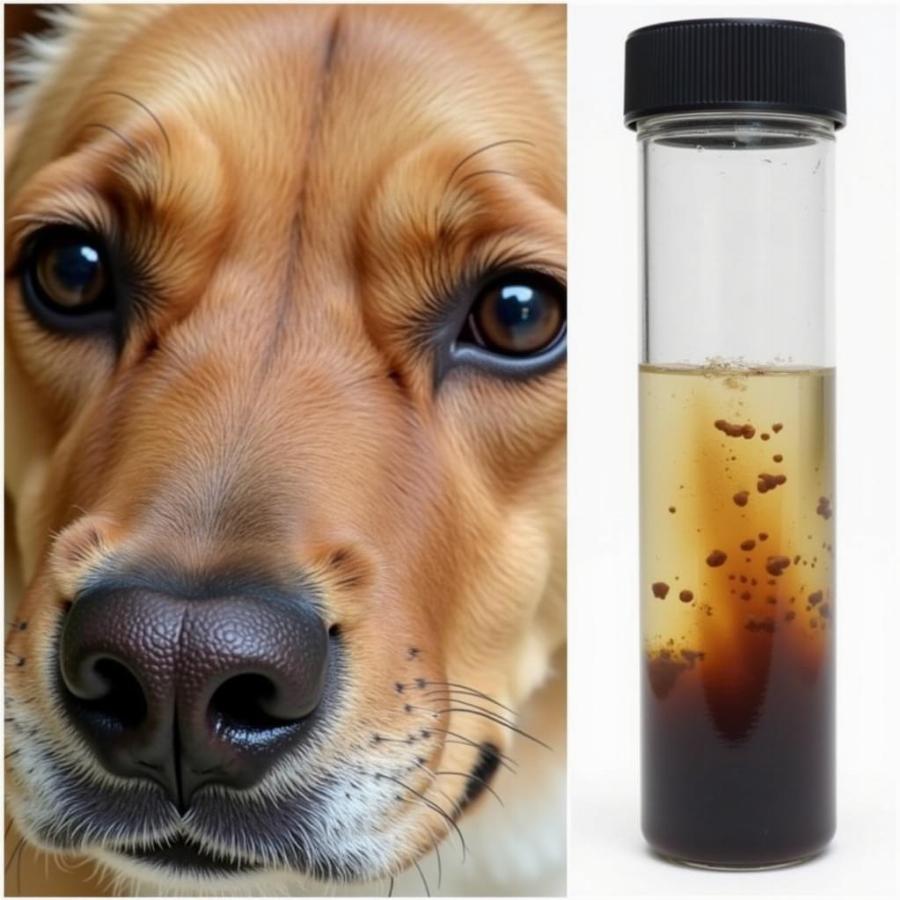Dark urine in dogs can be alarming for any pet owner. While not always a cause for panic, it’s a sign that something may be off with your furry friend and warrants further investigation. Understanding the potential causes, recognizing accompanying symptoms, and knowing when to seek veterinary care is crucial for ensuring your dog’s well-being. This article will delve into the reasons behind dark pee in dogs, from simple dehydration to more serious underlying medical conditions.
Dehydration: A Common Culprit
One of the most frequent reasons for dark urine is dehydration. Just like in humans, when a dog isn’t getting enough water, their urine becomes more concentrated, resulting in a darker yellow or even brownish hue. This is often easily remedied by ensuring your dog has access to fresh, clean water at all times. Encourage drinking by adding a little low-sodium chicken broth or using a pet water fountain. If your dog seems uninterested in water despite the darker urine, it’s important to consult a veterinarian.
Underlying Medical Issues: Causes for Concern
While dehydration is a common and often benign cause, dark urine can also indicate more serious health problems. These include urinary tract infections (UTIs), bladder stones, liver disease, kidney problems, and even certain types of cancer. These conditions require prompt veterinary attention and diagnosis.
Urinary Tract Infections (UTIs)
UTIs are bacterial infections that can affect any part of the urinary system, including the bladder and kidneys. Alongside dark or cloudy urine, symptoms can include frequent urination, straining to urinate, accidents in the house, and blood in the urine.
Bladder Stones
These hard mineral formations can irritate the bladder lining and cause bloody or dark urine. Other signs might include pain during urination and frequent trips to the potty.
Liver Disease and Kidney Problems
These serious conditions can significantly impact urine color. Liver problems often cause the urine to appear dark brown, almost like tea, while kidney issues might result in very dark or even reddish urine. These conditions require immediate veterinary care.
Other Potential Causes
Certain medications, toxins, and even some foods can cause changes in urine color. It’s important to provide your vet with a complete history of your dog’s diet, medications, and any potential exposure to toxins.
 Dog Showing Signs of Dehydration and Dark Urine
Dog Showing Signs of Dehydration and Dark Urine
When is Dark Pee an Emergency?
While occasional dark urine due to dehydration isn’t typically an emergency, persistent dark urine accompanied by other symptoms warrants immediate veterinary attention. Lethargy, vomiting, loss of appetite, increased thirst, or pain should be treated as red flags.
Diagnosing the Cause of Dark Urine
Your veterinarian will likely perform a physical exam and recommend diagnostic tests such as urinalysis, blood work, and possibly imaging studies like X-rays or ultrasound to pinpoint the underlying cause. Providing your vet with as much information as possible about your dog’s symptoms, recent changes in diet or environment, and any known medical history can help with accurate diagnosis.
What can I do if my dog has dark pee?
First, ensure your dog has access to plenty of fresh water. If the dark urine persists, make an appointment with your veterinarian as soon as possible. Early diagnosis and treatment are key to managing any underlying health concerns.
Preventing Dark Urine in Dogs
The best way to prevent dark urine related to dehydration is to ensure your dog always has access to fresh, clean water. Regular check-ups with your veterinarian can also help detect and address potential health problems early on. Offering a balanced diet, appropriate exercise, and a clean living environment contribute to your dog’s overall health and well-being, reducing the risk of many conditions that can cause dark urine. Consider using a dog pee neutralizer for grass to maintain a healthy lawn.
Conclusion
Dark pee in dogs can range from a simple sign of dehydration to an indicator of a more serious medical condition. Paying close attention to your dog’s urine color and any accompanying symptoms is vital. If you’re concerned about your dog’s dark urine, don’t hesitate to contact your veterinarian. Early diagnosis and intervention can significantly improve your dog’s health outcomes. Remember, being proactive and informed is the best way to ensure your furry companion lives a long, happy, and healthy life.
FAQ
-
What does normal dog urine look like? Normal dog urine should be a pale yellow to amber color and relatively clear.
-
Can heat cause dark urine in dogs? Yes, hot weather can increase water loss through panting, leading to dehydration and darker urine.
-
Is dark urine always a sign of something serious? Not always. Dehydration is a common cause, but persistent dark urine should be checked by a veterinarian.
-
What should I do if my dog’s urine is dark and cloudy? Contact your veterinarian immediately, as this could indicate an infection.
-
Can certain dog foods cause dark urine? While unlikely, some food dyes or ingredients could potentially affect urine color. If you suspect a food allergy, consult your vet.
-
How can I encourage my dog to drink more water? Try using a pet water fountain, adding a little low-sodium chicken broth to their water, or providing multiple water bowls around the house.
Further Questions?
If you have more questions or are interested in learning more about dog health, be sure to explore other articles on our site like dog pee green or find the best nail trimmer for large dogs. We also have information on nail filer for dogs and breeds of brindle dogs.
Beaut Dogs: Your Trusted Source for Dog Care Information
Beaut Dogs is your one-stop shop for everything dog-related. We provide reliable, expert information to help you navigate the wonderful world of dog ownership. From breed information to health tips, we’re here to help you keep your furry friend happy and healthy. When you need assistance, contact Email: [email protected] to receive detailed and accurate answers from Beaut Dogs. Visit https://beautdogs.com today!